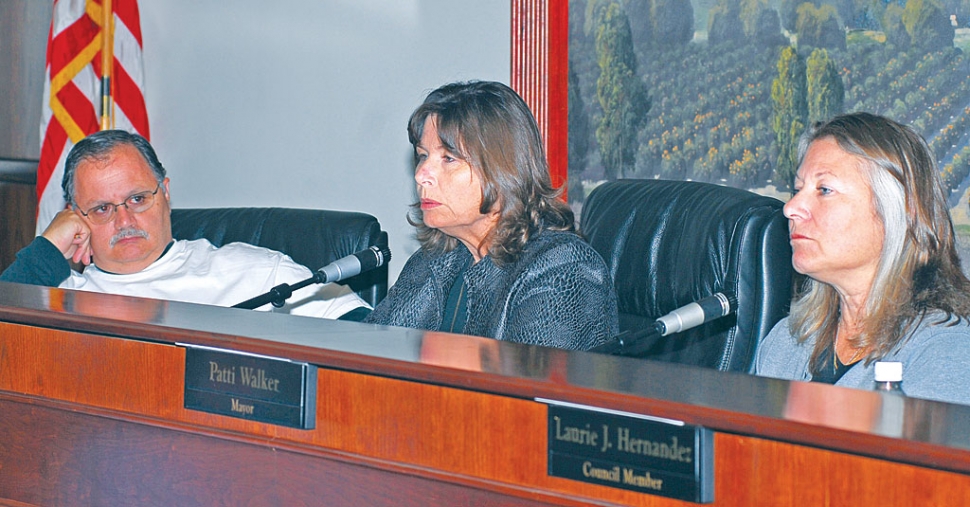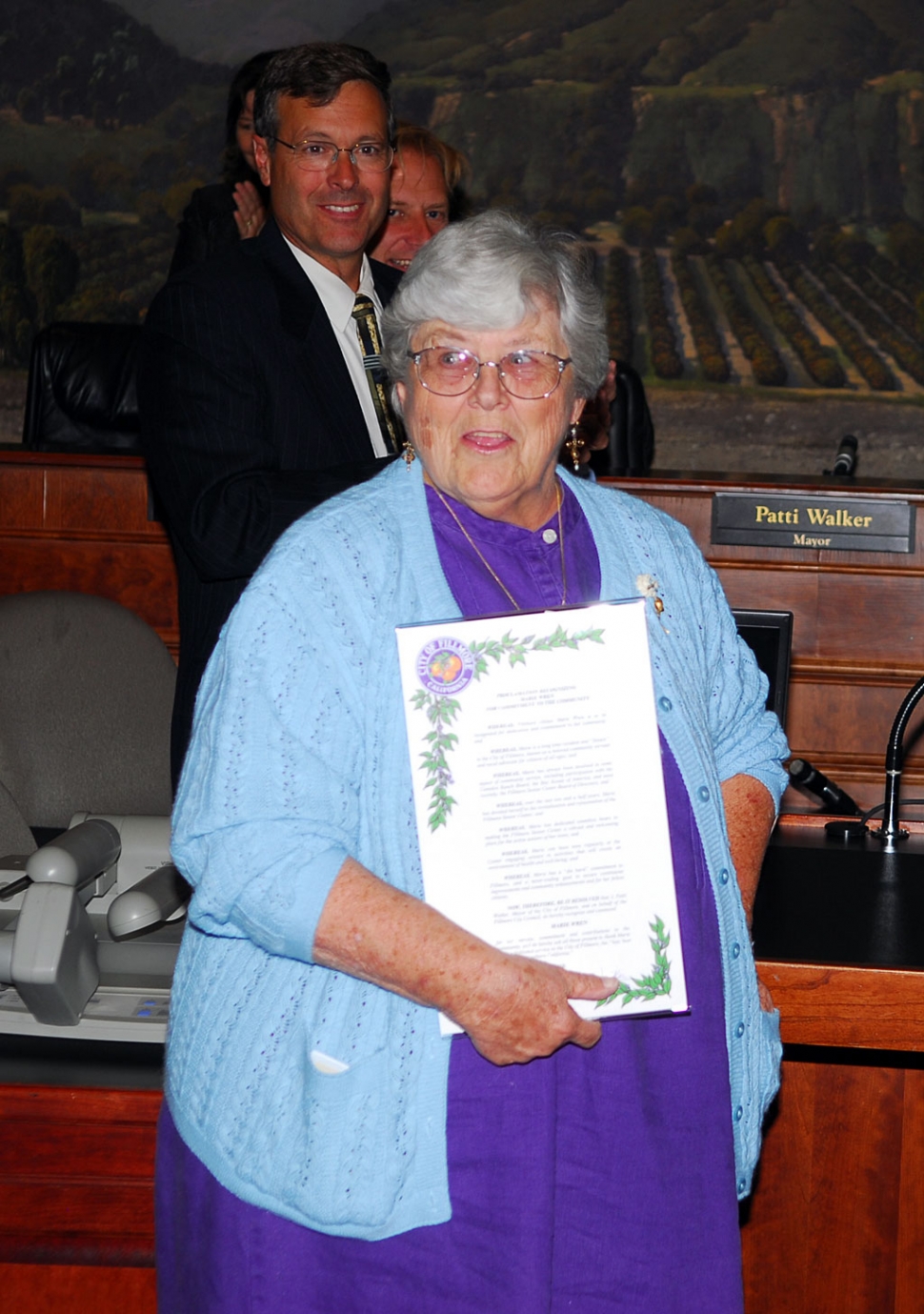|
Oh—the joy!
 Councilman Jamey Brooks, Mayor pro-tem Gayle Washburn, and Mayor Patti Walker express their dismay upon learning that the Fillmore Gazette, not the Ventura Star, must, by law, be recognized as Newspaper of Record for the City of Fillmore. Their months-long clandestine efforts to steal this distinction from the Gazette has resulted in failure, and added expense to the city. By Jean McLeod — Wednesday, September 15th, 2010
Gazette remains city's Newspaper of Record
 Marie Wren received a proclamation from the City of Fillmore after retiring from the Senior Center Board. The Sept 14th Fillmore City Council was a joint meeting of the City Council and Planning Commission. The meeting began with about 40 in attendance and went late into the night, ending close to midnight. The agenda covering a wide range of topics that included water and sewer rates, counting of the protest ballots, street cleaning, baseball backstops at Two Rivers Park, Fillmore’s legal publications “Newspaper of Record” along with a few others. Again, as with the City Council’s last meeting, the main focus was on questions from the public in regard to Proposition 218 which is the Water Ordinance 10-821, a proposed water and sewer rate increase. But the awarding of the contract for legal publications t the Gazette also was of great interest. Consideration for the Award of Contract for City Legal Publications, “Newspaper of Record” for FY 2010-11 became a heated topic with many voicing their views. Citizen Kenneth Creason stated he was deeply opposed to giving the award to the Fillmore Gazette. He mentioned the Gazette’s lack of coverage of “good news” sighting the paper’s omission of a donation made to the Fillmore Senior Center for their salad bar (Front Page, April 15th edition under “Presentations” - http://www.fillmoregazette.com/front-page/medical-marijuana-city-morator...). Creason also said he cancelled his subscription to the Gazette because “Roy Payne” was allowed to write Letters to the Editor over the 250 word limit while no one else was (a false claim already exposed in response to Councilmember Gayle Washburn’s Letter dated 09/03/09 - http://www.fillmoregazette.com/letters/september-3rd-2009). Both false claims can be viewed as such online (hardcopies available at Fillmore Library for viewing). Councilmember Jamey Brooks stated, “Mr. Farrell is a slanderer…I will never vote for him.” Councilmember Laurie Hernandez defended the Gazette by speaking directly to the naysayers, “He writes about me too—it’s an opinion. I vote yes.” Councilmember Steve Conaway asked City attorney Ted Schneider, pointedly, if the Ventura Star could publish the city legals. Schneider said “No”. Conaway also asked if awarding the Star the contract would put the city at legal risk. Schneider answered “Yes”. The City of Fillmore had asked both the Fillmore Gazette and the Ventura County Star to give bids on the contract. The Ventura County Star is not the adjudicated paper of record for the city of Fillmore, the Gazette is, and law requires that if there is a local paper it must be awarded the contract.. A vote was taken with council members Brooks voting no, Washburn abstaining, Conaway voting yes, Hernandez voting yes and Walker voting yes “regrettably”. Regarding Proposition 218, those in attendance addressed the council with their concerns over the added fees and pointed out that with the economy in such a sour state, the increases would create a great hardship on many of Fillmore’s residents. Larry Jennings asked the council if a tiered block rate, as is structured in Ventura, could be used, suggesting that a “use more, pay more” would seem fairer. “We’re paying for a lot that we’re not getting” Jennings stated, and that when he moved here to Fillmore in 1990 his water bill was $15. Edwardo Gonzalez director of Fillmore Convalescent explained the impact the fee hike would have on his business along with the cost of replacing the water lines associated with the property. He reminded the council that all but 18 of his residents are on Medical, and because of Medical’s fixed pay rate he could not recover the increase in operating expense from the water and sewer rate increase or the cost of replacing the existing water lines on the property. Dorcey Smith asked the council why this increase hadn’t been done over the last four years in a level manor, and stated, “You need to get everything out in the open. I don’t think you did this out in the open. We should have been told this at the beginning.” Ray Johnson, spoke of the 300 units in El Dorado Mobile Home Park where he resides, and that all the units are individually billed for water, yet the residents had no say in the protest since the property only has one parcel number and one vote. Lupe Grimaldo pointed out a mistake on the ballots that could easily confuse the property owners. The council was unaware of the printing error and agreed that it could have confused some property owners. The City Attorney Theodore Schneider stated, “Under Proposition 218 the city was under no obligation to mail out a ballot.” Prop 218 only required the property owner be notified of the fee increase and given an opportunity to protests the measure. The property owners could have been expected to mail in their own written protest. The city required 2,006 ballots in protest of the increases for each measure, which is 50.1% of the ballots mailed out, to stop the fee increases. The City of Fillmore sent out 4,006 protest ballots to property owners. Each property owner received one protest ballot for sewer and one for water. Property owners returned 665 ballots protesting the water increase and 590 protesting the sewer increase, which was far less than the required 2,006 of either the water protest or sewer protest ballot for the measures to have failed. A vote by four council members was taken on the measure with Councilmember Hernandez absent because she left early. The four remaining members, Brooks, Conaway, Washburn and Mayor Walker took the first vote with Brooks and Washburn voting no and the remaining two members voting yes. Washburn stated she couldn’t agree to the stand by charge which is a charge to help pay for fixed costs. Members and the city attorney then suggested a moratorium could be put on the stand by charge. It was agreed to instruct the staff put hold on the stand by charge and that the council would discuss it again in 6 months after reviewing the results of the measure without it. Another vote was taken which was unanimous. The new rates take affect October 15, 2010. The water and sewer fee increases were not the only concern of those who attended the council meeting. David Lugo asked why a check for $29,030 had been given to City Manager Yvonne Quiring for moving expenses. He also questioned the salary paid to Quiring who is the highest paid city manager ever to work for Fillmore with $156,003 in wages and $79,751 in benefits, a total compensation of $235,754 per year. The moving expenses were explained as part of the contract she negotiated with the city upon hiring. The council was also asked how much revenue the $1.20 fee added to the water bill for street sweeping was expected to generate and if they had received bids from other companies besides Harrison to do the street cleaning. The council said the revenue would be $70,000 a year and that they would look into getting other bids. |
